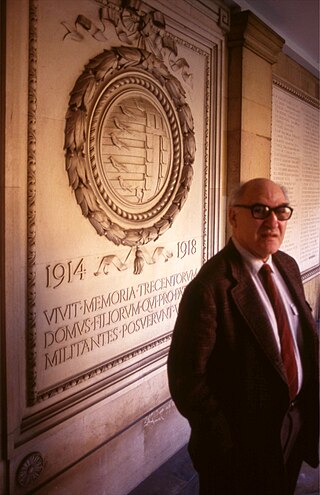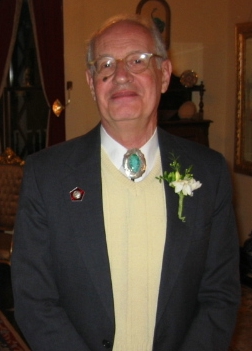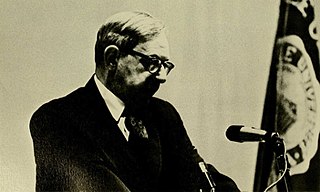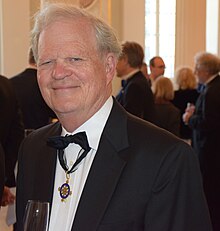
Willis Eugene Lamb Jr. was an American physicist who won the Nobel Prize in Physics in 1955 "for his discoveries concerning the fine structure of the hydrogen spectrum." The Nobel Committee that year awarded half the prize to Lamb and the other half to Polykarp Kusch, who won "for his precision determination of the magnetic moment of the electron." Lamb was able to precisely determine a surprising shift in electron energies in a hydrogen atom. Lamb was a professor at the University of Arizona College of Optical Sciences.

Gerhard "George" Lachmann Mosse was a German-American social and cultural historian, who emigrated from Nazi Germany to Great Britain and then to the United States. He was professor of history at the University of Iowa, the University of Wisconsin–Madison, and also in Israel, at the Hebrew University of Jerusalem. Best known for his studies of Nazism, he authored more than 25 books on topics as diverse as constitutional history, Protestant theology, and the history of masculinity. In 1966, he and Walter Laqueur founded The Journal of Contemporary History, which they co-edited.

Friedrich Meinecke was a German historian with national liberal and antisemitic views who supported the Nazi invasion of Poland. As a representative of an older tradition he criticized the Nazi regime after World War II but continued to express antisemitic prejudices.

Fritz Richard Stern was a German-born American historian of German history, Jewish history and historiography. He was a University Professor and a provost at New York's Columbia University. His work focused on the complex relationships between Germans and Jews in the 19th and 20th centuries and on the rise of National Socialism in Germany during the first half of the 20th century.
Peter Paret was a German-born American cultural and intellectual historian, whose two principal areas of research were war and the interaction of art and politics from 18th to 20th century Europe. He also wrote on related subjects.

Gerhard Ludwig Weinberg is a German-born American diplomatic and military historian noted for his studies in the history of Nazi Germany and World War II. Weinberg is the William Rand Kenan, Jr. Professor Emeritus of History at the University of North Carolina at Chapel Hill. He has been a member of the history faculty at UNC-Chapel Hill since 1974. Previously he served on the faculties of the University of Michigan (1959–1974) and the University of Kentucky (1957–1959).
James Westfall Thompson (1869–1941) was an American historian specializing in the history of medieval and early modern Europe, particularly of the Holy Roman Empire and France. He also made noteworthy contributions to the history of literacy, libraries and the book trade in the Middle Ages.
Alexander Davidovich Dallin was an American historian, political scientist, and international relations scholar at Columbia University, where he was the Adlai Stevenson Professor of International Relations and the director of the Russian Institute. Dallin was also the Raymond A. Spruance Professor of International History at Stanford University, and served as Director for the Center for Russian and East European Studies.

Felix Gilbert was a German-born American historian of early modern and modern Europe. Gilbert was born in Baden-Baden, Germany, to a middle-class Jewish family, and part of the Mendelssohn Bartholdy clan. In the latter half of the 1920s, Gilbert studied under Friedrich Meinecke at the University of Berlin. Gilbert's area of expertise was the Renaissance, especially the diplomatic history of the period He was a fellow of the Institute for Advanced Study in Princeton from 1962 to 1975, and maintained an active involvement as an emeritus faculty member until his death in 1991. He was elected to the American Academy of Arts and Sciences in 1963 and the American Philosophical Society in 1969.
Margaret Lavinia Anderson is professor emerita at University of California Berkeley where she teaches about Europe since 1453; Central Europe from the late 18th century, especially modern Germany; World War I; Fascist Europe. She won a 2001 Berlin prize by the American Academy in Berlin, and was a 2008 Guggenheim Fellow. She was a fellow at Stanford Humanities Center.
Friedrich Katz was an Austrian-born anthropologist and historian who specialized in 19th- and 20th-century history of Latin America, particularly in the Mexican Revolution.

Philip Vilas Bohlman is an American ethnomusicologist.
Hans Wilhelm Gatzke (1915–1987) was a German-born historian of German foreign policy since World War I and belonged to the young emigrants from Nazi Germany who became historians in the United States. He is remembered by a named professorship in his honor at Williams College and a named dissertation prize at Yale University.
Theodore Stephen Hamerow was a Polish-born American historian, focusing on modern history, especially German history of the 19th and 20th century.
Georg Gerson Iggers was an American historian of modern Europe, historiography, and European intellectual history.
Joachim Remak was an American historian of Modern Europe, especially of Germany and World War I.
Ursula Schäfer Lamb was a distinguished American historian specializing in Latin American history, who published works on the age of exploration and the history of science. She was a pioneering female academic in Latin American history, whose interdisciplinary works on the history of science and globalization antedate the recent boom in such studies.
John Leonard Clive was an American historian. He was a professor at Harvard University and the University of Chicago. He is most well known for his biography of Thomas Babington Macaulay: The Shaping of the Historian, for which he won the National Book Award for Biography and History.
Andreas W. Daum is a German-American historian who specializes in modern German and transatlantic history, as well as the history of knowledge and global exploration.
Hartmut Lehmann is a German historian of modern history who specializes in religious and social history. He is known for his research on Pietism, secularization, religion and nationalism, transatlantic studies and Martin Luther. He was the founding director of the German Historical Institute Washington DC and was a director of the Max Planck Institute for History. He is an emeritus honorary professor at Kiel University and the University of Göttingen.







